Faye Fite's Blog, page 22
January 30, 2017
WriteOnCon: An Awesome Online Writing Conference You Should Attend
What is this? Hannah posting on a Monday instead of a Friday? The sky is falling!
Don't worry. There will still be a writing tips post coming this Friday. Every once in a while I choose to post on a Monday when I have news I want to share outside of my regular posts. Well, today I have something I think you all will be interested in. Listen up.
I was recently given the awesome opportunity to be a WriteOnCon team member. WriteOnCon is an online writing conference geared towards KidLit, MG, YA, and New Adult authors. It's a pretty epic event that I've heard of before and considered attending, so of course I was pretty excited to get to be part of the team that brings it to the masses in all of its glory.
So, why am I telling this to you? Because the more I've been working on this event, the cooler and cooler it seems to me. I think it's something you all might really enjoy, so let me give you a brief overview of what it is:
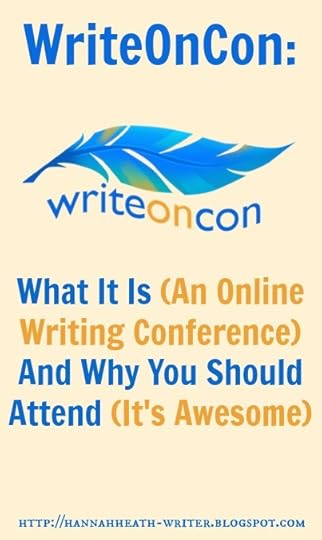 Yep. The above image says it all. Post over. Return to your writing.
Yep. The above image says it all. Post over. Return to your writing.
Just kidding. Allow me to expand:
WriteOnCon is an 3 day online writing conference for writers and illustrators of picture books, middle grade, young adult, and even new adult. So, basically everybody except for boring adult authors. You aren't allowed to sit with us cool kids. Just kidding. While some of the critiquing events are limited to the above categories, the live events, blog posts, and vlogs are open to every writer out there. Come one, come all!
This event runs from February 2nd (a Thursday), through February 4th (a Saturday). There will be blog posts, vlogs, live events, critique forums, and pitch sessions. The live events are held on Facebook and will include Q&A sessions with various authors, agents, and editors, along with critique sessions.
The Q&A sessions allow you to get some of those writerly questions answered. From publishing to editing to character development, you can post questions to live events and get some answers. This is my favorite part of the event because it means you all can bring your questions to somebody other than me. Just kidding. But seriously. Take advantage of this. Here's the schedule for you to peruse to find out which Q&A events look like your jam.
There's also going to be an online forum where you can post your polished query letters or samples of your writing. Agents and editors, known as Ninja Agents, will be somersaulting in and out of these forums, reading pitches and sample writings, offering feedback, and doing other ninja-y things.
 How insanely helpful is that? You can check out the list of the Ninja Agents here.
How insanely helpful is that? You can check out the list of the Ninja Agents here.
But here's something else that's even better: Paying to attend this event isn't going to mean that you have to skimp on buying yourself coffee or a new book to read. Nobody wants to see a writer coffeeless or bookless. This is a humane event. There are different levels of admission, the most expensive one being $15. Told you it was cheap. To read about the different kinds of admission, click here. But I recommend the Extended Admission.
And you know what else is cool? This event is entirely online. Which means that you do not have to go outside and interact with other humans. Ew. You can sit at your computer wearing your bunny slippers and Batman hoodie and interact with other people via your brilliant writing, so nobody will be the wiser. Major plus.
I'm really excited about WriteOnCon, not only because I get to be part of the amazing team, but because I think its something that many of you would actually get a lot out of. It has something for every writer and it's a great way to connect with people in the writing industry, as well as to learn tricks of the trade, gain new perspectives, and just have a fun experience.
If this seems like something you're interested in, you can register here. And if you have questions, you can check out the FAQ page or read the blog.
So what do you think? Are you going to attend WriteOnCon? If so, I'm helping out with the live events, so I'll keep an eye out for your name down in the comments section and send encouraging writerly thoughts your way. Please leave a comment below and let me know what you think!
Enjoy this post? Take a look around! If you like what you see, subscribe by email for a new post every Friday!
Don't worry. There will still be a writing tips post coming this Friday. Every once in a while I choose to post on a Monday when I have news I want to share outside of my regular posts. Well, today I have something I think you all will be interested in. Listen up.
I was recently given the awesome opportunity to be a WriteOnCon team member. WriteOnCon is an online writing conference geared towards KidLit, MG, YA, and New Adult authors. It's a pretty epic event that I've heard of before and considered attending, so of course I was pretty excited to get to be part of the team that brings it to the masses in all of its glory.
So, why am I telling this to you? Because the more I've been working on this event, the cooler and cooler it seems to me. I think it's something you all might really enjoy, so let me give you a brief overview of what it is:
 Yep. The above image says it all. Post over. Return to your writing.
Yep. The above image says it all. Post over. Return to your writing. Just kidding. Allow me to expand:
WriteOnCon is an 3 day online writing conference for writers and illustrators of picture books, middle grade, young adult, and even new adult. So, basically everybody except for boring adult authors. You aren't allowed to sit with us cool kids. Just kidding. While some of the critiquing events are limited to the above categories, the live events, blog posts, and vlogs are open to every writer out there. Come one, come all!
This event runs from February 2nd (a Thursday), through February 4th (a Saturday). There will be blog posts, vlogs, live events, critique forums, and pitch sessions. The live events are held on Facebook and will include Q&A sessions with various authors, agents, and editors, along with critique sessions.
The Q&A sessions allow you to get some of those writerly questions answered. From publishing to editing to character development, you can post questions to live events and get some answers. This is my favorite part of the event because it means you all can bring your questions to somebody other than me. Just kidding. But seriously. Take advantage of this. Here's the schedule for you to peruse to find out which Q&A events look like your jam.
There's also going to be an online forum where you can post your polished query letters or samples of your writing. Agents and editors, known as Ninja Agents, will be somersaulting in and out of these forums, reading pitches and sample writings, offering feedback, and doing other ninja-y things.
 How insanely helpful is that? You can check out the list of the Ninja Agents here.
How insanely helpful is that? You can check out the list of the Ninja Agents here.But here's something else that's even better: Paying to attend this event isn't going to mean that you have to skimp on buying yourself coffee or a new book to read. Nobody wants to see a writer coffeeless or bookless. This is a humane event. There are different levels of admission, the most expensive one being $15. Told you it was cheap. To read about the different kinds of admission, click here. But I recommend the Extended Admission.
And you know what else is cool? This event is entirely online. Which means that you do not have to go outside and interact with other humans. Ew. You can sit at your computer wearing your bunny slippers and Batman hoodie and interact with other people via your brilliant writing, so nobody will be the wiser. Major plus.
I'm really excited about WriteOnCon, not only because I get to be part of the amazing team, but because I think its something that many of you would actually get a lot out of. It has something for every writer and it's a great way to connect with people in the writing industry, as well as to learn tricks of the trade, gain new perspectives, and just have a fun experience.
If this seems like something you're interested in, you can register here. And if you have questions, you can check out the FAQ page or read the blog.
So what do you think? Are you going to attend WriteOnCon? If so, I'm helping out with the live events, so I'll keep an eye out for your name down in the comments section and send encouraging writerly thoughts your way. Please leave a comment below and let me know what you think!
Enjoy this post? Take a look around! If you like what you see, subscribe by email for a new post every Friday!

Published on January 30, 2017 07:23
January 27, 2017
Treacle Tart Inspired by J.K. Rowling's Harry Potter and the Goblet of Fire
At the end of each month I always almost always post a recipe that uses a beloved food from a book that I like. This month's Book of the Month is
Harry Potter and the Goblet of Fire
because 1) I love Harry Potter and 2) I'm trying to do a recipe from each Harry Potter book with the end goal of having a Great Hall feast. Because who hasn't dreamed about a Great Hall feast?
I fully intended to make bouillabaisse. I was always rather disappointed that this scene never made it into the m...
I fully intended to make bouillabaisse. I was always rather disappointed that this scene never made it into the m...
Published on January 27, 2017 07:03
January 20, 2017
9 Epic, Underused Mythical Animals for Your Fantasy Novel
So you're writing a fantasy novel? You're going to need a starter bag: Do you have your hero? Check. Your sidekick? Check. Your villain? Check. Your magic system? Check. Your different races (elves, dwarves, humans, etc)? Check. That big forest all fantasy characters invariably have to travel through? Check.
It would seem that your starter bag is full. Now go forth and conquer your story world! *stands back and watches you leave*
Wait, wait! Come back! We forgot about your mythical animals. Phew. That could have been bad.
No, you don't technically need any of the items in that starter bag I just gave you. Just like you don't technically need mythical animals. But you want them. You know you do.
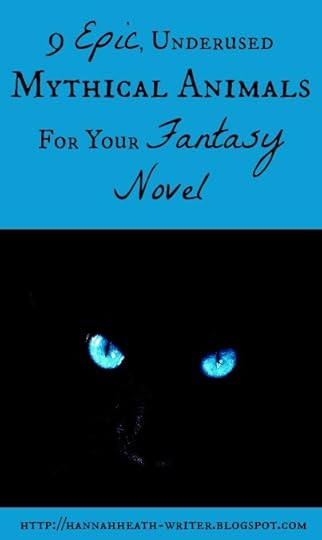 But, of course, you may not want the same exact mythical animals that everybody else has. What's the fun in that? I mean, I'm sure you already have creatures lined up: Dragons, griffins, mermaids, harpies, Pegasi, minotaurs, pixies, phoenixes, unicorns. Those are all great. You'll probably never run into a reader who is upset that you included a dragon in your fantasy novel (and if you do, that person is probably insane. RUN!).
But, of course, you may not want the same exact mythical animals that everybody else has. What's the fun in that? I mean, I'm sure you already have creatures lined up: Dragons, griffins, mermaids, harpies, Pegasi, minotaurs, pixies, phoenixes, unicorns. Those are all great. You'll probably never run into a reader who is upset that you included a dragon in your fantasy novel (and if you do, that person is probably insane. RUN!).
But what about some new ones? Using less common mythical animals in your fantasy story can lend uniqueness and depth to your world. Plus, they're incredibly cool.
Below are a list of really interesting, underused mythical creatures for you to peruse. If they look cool to you and fit into your world, why not include them in your writing? These poor guys never see the light of day. And, in case you're wondering, these are all actually "real" mythical creatures. I ain't got the brains to make this up:
1. Peryton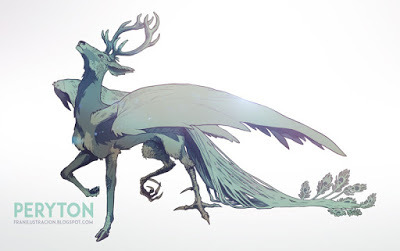 Source: FranIlustracion
Source: FranIlustracion
The head, antlers, and forelegs of a stag, but the wings and hindquarters of a bird, this mythical animal is my personal favorite. Think of what an epic steed it would make: majestic and deadly. All it needs to do is breathe fire (and maybe have scales for protection) and this makes a formidable creature.
2. Enfield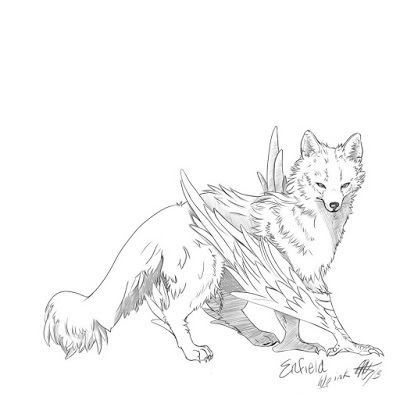 Image source
Image source
There's really no formal description for this one, but it has the head of a fox and the forelegs of an eagle. Sometimes it has the hindlegs of a wolf. I'd imagine this could have a tricky personality (perhaps it acts as a spy?) and I see no reason why it couldn't have wings.
3. Crocotta Source: Wikia
Source: Wikia
A fierce hyena-like creature, the crocotta has the body of a stag, cloven hooves, and the head of a hyena or badger. It is the enemy of man and dog, has sharp teeth, and makes noises that mimic the sound of human laughter. Basically a large, angry hyena with hooves. You don't want to mess with it.
4. Wolpertinger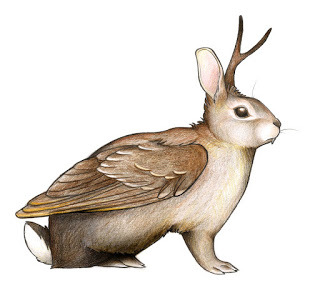 Source: ObeyTheKiwi
Source: ObeyTheKiwi
So, remember that Jackolope with purple eyes from Disney? The one that taught us that boudin' was the way to happiness? Well, the wolpertinger is like that guy. Except it's the size of a hare and has fangs and wings. While the above picture makes it look adorable, being attacked by a real-life one would probably scare the daylights out of even the bravest warrior. I feel that this is what the characters in Watership Down would have looked like if Lewis Carrol had penned the story.
5. Chupacabra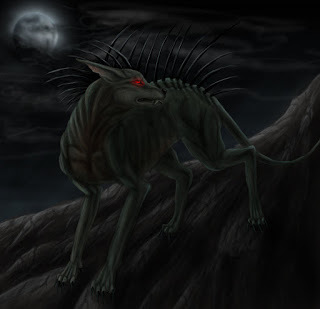 Source: LuxDaniThe name means "goat sucker," since this animal from North America is said to suck the blood of various livestock, especially goats. It has scaly greenish skin with spikes running along its spine and/or tail. It's actually considered a cryptic (a creature that may or may not exist), as Puerto Rico had a problem with their livestock being drained of all their blood via puncture wounds. Some were convinced it was the chupacabra, while others thought it was a local satanic cult performing rituals. Either way, they'd make great lapdogs for your villains.
Source: LuxDaniThe name means "goat sucker," since this animal from North America is said to suck the blood of various livestock, especially goats. It has scaly greenish skin with spikes running along its spine and/or tail. It's actually considered a cryptic (a creature that may or may not exist), as Puerto Rico had a problem with their livestock being drained of all their blood via puncture wounds. Some were convinced it was the chupacabra, while others thought it was a local satanic cult performing rituals. Either way, they'd make great lapdogs for your villains.
6. Karkadann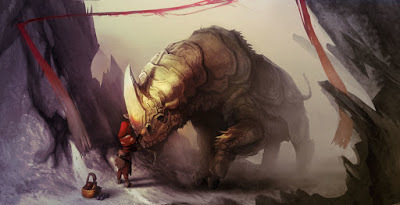 If you need a creature for a desert, this is it. From Persia, Karkadanns are similar to rhinoceroses: they are large, scaly, have a horn on their nose (though sometimes it can sit higher on their head and varies in length and curve), and dewlap about the chest. Their horns are said to have have healing power, but they are highly agressive, so good luck if you need that horn for some kind of spell.
If you need a creature for a desert, this is it. From Persia, Karkadanns are similar to rhinoceroses: they are large, scaly, have a horn on their nose (though sometimes it can sit higher on their head and varies in length and curve), and dewlap about the chest. Their horns are said to have have healing power, but they are highly agressive, so good luck if you need that horn for some kind of spell.
7. Kirin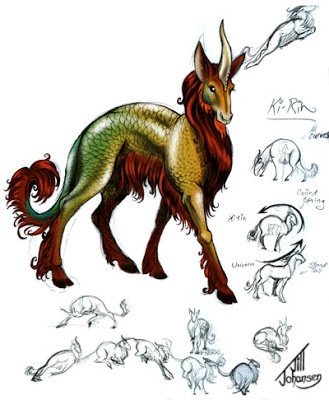 Source: Jill Johansen
Source: Jill Johansen
It comes from East Asia, the spelling and look of the creature varying from country to country. Some call it the Asian Unicorn, though it can have antlers rather than a single horn. It is a hoofed, deer-like creature that usually has both scales and fur. It is sometimes depicted as being covered in flame, which is awesome. Fantasy 101: Never pass up using an animal that can cover itself in flame.
8. Camazotz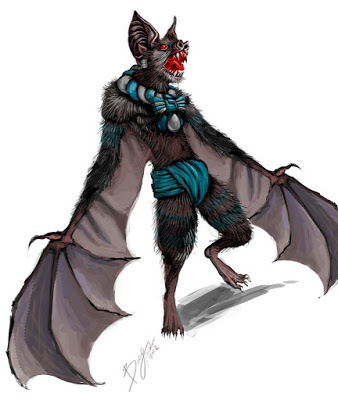 Okay, so, this one is technically not an animal. It's a bat god from Maya mythology. But I thought the concept was interesting, so I'm including it here: He's a man-sized bat who drinks the blood of his enemies. I'm pretty sure this is what Batman would reincarnate as, supposing he dies. But he would never die. Because he's Batman.
Okay, so, this one is technically not an animal. It's a bat god from Maya mythology. But I thought the concept was interesting, so I'm including it here: He's a man-sized bat who drinks the blood of his enemies. I'm pretty sure this is what Batman would reincarnate as, supposing he dies. But he would never die. Because he's Batman.
Yes, I may have included Camazotz here solely for the purpose of saying that. I'm not even sorry.
9. Hippocampus You've probably already heard of this one, but, outside of the Percy Jackson series, it doesn't really get written into stories. Which is sad. Just look at how amazing it is.
You've probably already heard of this one, but, outside of the Percy Jackson series, it doesn't really get written into stories. Which is sad. Just look at how amazing it is.
Those are just some of the more interesting ones I've come across. There are a plethora of humanoid creatures I haven't included here. I also had to exclude these excellent ones to keep this post from running long: Manticore, selkie, wendigo, nian, and wyvern.
Which of these is your favorite? I hope this provided you with some inspiration (and my apologies for any plot bunnies...or wolpertingers). What kind of mythical animals do you use in your stories? I'd love to hear what awesome creatures you have in your fictional worlds. Please leave a comment below and tell me about them!
Related articles:
9 Different Descriptive Settings to Use In Your Fantasy Novel (Without Using Forests)
8 Tips to Improve Your Descriptive Writing
7 Tips for Choosing Your Character's Appearance
Enjoy this post? Take a look around. If you like what you see, don't forget to subscribe by email for a new post every Friday!
Some links are Amazon affiliate. Thank you for your support!

It would seem that your starter bag is full. Now go forth and conquer your story world! *stands back and watches you leave*
Wait, wait! Come back! We forgot about your mythical animals. Phew. That could have been bad.
No, you don't technically need any of the items in that starter bag I just gave you. Just like you don't technically need mythical animals. But you want them. You know you do.
 But, of course, you may not want the same exact mythical animals that everybody else has. What's the fun in that? I mean, I'm sure you already have creatures lined up: Dragons, griffins, mermaids, harpies, Pegasi, minotaurs, pixies, phoenixes, unicorns. Those are all great. You'll probably never run into a reader who is upset that you included a dragon in your fantasy novel (and if you do, that person is probably insane. RUN!).
But, of course, you may not want the same exact mythical animals that everybody else has. What's the fun in that? I mean, I'm sure you already have creatures lined up: Dragons, griffins, mermaids, harpies, Pegasi, minotaurs, pixies, phoenixes, unicorns. Those are all great. You'll probably never run into a reader who is upset that you included a dragon in your fantasy novel (and if you do, that person is probably insane. RUN!).But what about some new ones? Using less common mythical animals in your fantasy story can lend uniqueness and depth to your world. Plus, they're incredibly cool.
Below are a list of really interesting, underused mythical creatures for you to peruse. If they look cool to you and fit into your world, why not include them in your writing? These poor guys never see the light of day. And, in case you're wondering, these are all actually "real" mythical creatures. I ain't got the brains to make this up:
1. Peryton
 Source: FranIlustracion
Source: FranIlustracionThe head, antlers, and forelegs of a stag, but the wings and hindquarters of a bird, this mythical animal is my personal favorite. Think of what an epic steed it would make: majestic and deadly. All it needs to do is breathe fire (and maybe have scales for protection) and this makes a formidable creature.
2. Enfield
 Image source
Image sourceThere's really no formal description for this one, but it has the head of a fox and the forelegs of an eagle. Sometimes it has the hindlegs of a wolf. I'd imagine this could have a tricky personality (perhaps it acts as a spy?) and I see no reason why it couldn't have wings.
3. Crocotta
 Source: Wikia
Source: WikiaA fierce hyena-like creature, the crocotta has the body of a stag, cloven hooves, and the head of a hyena or badger. It is the enemy of man and dog, has sharp teeth, and makes noises that mimic the sound of human laughter. Basically a large, angry hyena with hooves. You don't want to mess with it.
4. Wolpertinger
 Source: ObeyTheKiwi
Source: ObeyTheKiwiSo, remember that Jackolope with purple eyes from Disney? The one that taught us that boudin' was the way to happiness? Well, the wolpertinger is like that guy. Except it's the size of a hare and has fangs and wings. While the above picture makes it look adorable, being attacked by a real-life one would probably scare the daylights out of even the bravest warrior. I feel that this is what the characters in Watership Down would have looked like if Lewis Carrol had penned the story.
5. Chupacabra
 Source: LuxDaniThe name means "goat sucker," since this animal from North America is said to suck the blood of various livestock, especially goats. It has scaly greenish skin with spikes running along its spine and/or tail. It's actually considered a cryptic (a creature that may or may not exist), as Puerto Rico had a problem with their livestock being drained of all their blood via puncture wounds. Some were convinced it was the chupacabra, while others thought it was a local satanic cult performing rituals. Either way, they'd make great lapdogs for your villains.
Source: LuxDaniThe name means "goat sucker," since this animal from North America is said to suck the blood of various livestock, especially goats. It has scaly greenish skin with spikes running along its spine and/or tail. It's actually considered a cryptic (a creature that may or may not exist), as Puerto Rico had a problem with their livestock being drained of all their blood via puncture wounds. Some were convinced it was the chupacabra, while others thought it was a local satanic cult performing rituals. Either way, they'd make great lapdogs for your villains.6. Karkadann
 If you need a creature for a desert, this is it. From Persia, Karkadanns are similar to rhinoceroses: they are large, scaly, have a horn on their nose (though sometimes it can sit higher on their head and varies in length and curve), and dewlap about the chest. Their horns are said to have have healing power, but they are highly agressive, so good luck if you need that horn for some kind of spell.
If you need a creature for a desert, this is it. From Persia, Karkadanns are similar to rhinoceroses: they are large, scaly, have a horn on their nose (though sometimes it can sit higher on their head and varies in length and curve), and dewlap about the chest. Their horns are said to have have healing power, but they are highly agressive, so good luck if you need that horn for some kind of spell. 7. Kirin
 Source: Jill Johansen
Source: Jill Johansen
It comes from East Asia, the spelling and look of the creature varying from country to country. Some call it the Asian Unicorn, though it can have antlers rather than a single horn. It is a hoofed, deer-like creature that usually has both scales and fur. It is sometimes depicted as being covered in flame, which is awesome. Fantasy 101: Never pass up using an animal that can cover itself in flame.
8. Camazotz
 Okay, so, this one is technically not an animal. It's a bat god from Maya mythology. But I thought the concept was interesting, so I'm including it here: He's a man-sized bat who drinks the blood of his enemies. I'm pretty sure this is what Batman would reincarnate as, supposing he dies. But he would never die. Because he's Batman.
Okay, so, this one is technically not an animal. It's a bat god from Maya mythology. But I thought the concept was interesting, so I'm including it here: He's a man-sized bat who drinks the blood of his enemies. I'm pretty sure this is what Batman would reincarnate as, supposing he dies. But he would never die. Because he's Batman.Yes, I may have included Camazotz here solely for the purpose of saying that. I'm not even sorry.
9. Hippocampus
 You've probably already heard of this one, but, outside of the Percy Jackson series, it doesn't really get written into stories. Which is sad. Just look at how amazing it is.
You've probably already heard of this one, but, outside of the Percy Jackson series, it doesn't really get written into stories. Which is sad. Just look at how amazing it is. Those are just some of the more interesting ones I've come across. There are a plethora of humanoid creatures I haven't included here. I also had to exclude these excellent ones to keep this post from running long: Manticore, selkie, wendigo, nian, and wyvern.
Which of these is your favorite? I hope this provided you with some inspiration (and my apologies for any plot bunnies...or wolpertingers). What kind of mythical animals do you use in your stories? I'd love to hear what awesome creatures you have in your fictional worlds. Please leave a comment below and tell me about them!
Related articles:
9 Different Descriptive Settings to Use In Your Fantasy Novel (Without Using Forests)
8 Tips to Improve Your Descriptive Writing
7 Tips for Choosing Your Character's Appearance
Enjoy this post? Take a look around. If you like what you see, don't forget to subscribe by email for a new post every Friday!
Some links are Amazon affiliate. Thank you for your support!

Published on January 20, 2017 06:39
January 13, 2017
How to Identify and Obliterate Sexism in Your Novel
I have something I want to talk about. It's not a popular topic in general (sexism in fiction), and the stance I'm taking is often frowned upon (that of common sense). So sit down, shut up, and pay close attention to the following words.
First off, let me explain something. Most people don't understand what the word "sexism" means. It means prejudice and discrimination against a person (or persons) due to their sex. People think that it pertains to prejudice against women. It doesn't. It goes...
First off, let me explain something. Most people don't understand what the word "sexism" means. It means prejudice and discrimination against a person (or persons) due to their sex. People think that it pertains to prejudice against women. It doesn't. It goes...
Published on January 13, 2017 06:41
January 6, 2017
The Q & A Tag: On Batmobiles and Lightsaber Skills
Happy New Year! 2017 is here and resolutions have been made by pretty much everybody except for me.
If I had made resolutions, they would have probably been something about time management and trying to write my posts further in advance (rather than the day before Friday). But I didn't. Which is why it's the first Thursday of the the new year and I have no time to put together a clever, helpful, or inspiring post.
And you know what? I don't even care. Why? Because I have a blog tag I can use to...
If I had made resolutions, they would have probably been something about time management and trying to write my posts further in advance (rather than the day before Friday). But I didn't. Which is why it's the first Thursday of the the new year and I have no time to put together a clever, helpful, or inspiring post.
And you know what? I don't even care. Why? Because I have a blog tag I can use to...
Published on January 06, 2017 06:51
December 30, 2016
Blancmange Inspired by Louisa May Alcott's Little Women
I think we all have that one character that we grew up with that was (and maybe still is) eerily similar to ourselves. We have the same personality, the same dreams, the same flaws. And, because of this, we've read their book over a dozen times and have a copy of it proudly displayed on our shelves.
My fictional twin is Jo March from Little Women . She's a tomboy, never quite fits in but doesn't usually mind, is a writer who works hard and dreams even harder, has a bad temper and a problem with saying things out loud that most people just keep locked up in their minds, wears her hair short, gets into trouble but generally is able to blunder her way back out, and has a good sense of humor.
Jo is pretty much me with the exception of our height (she got to be tall and I still struggle with reaching things on the top shelf) and our cooking skills (I can actually make pretty foods).
 Of course it's no surprise that Little Women was (and is) a favorite of mine. I grew up reading it and I'm always inspired by Jo and her fight for her writing career. In case you don't know what this story is (in which case....Christopher Columbus! What have you been doing with you life?), here's a brief synopsis:
Of course it's no surprise that Little Women was (and is) a favorite of mine. I grew up reading it and I'm always inspired by Jo and her fight for her writing career. In case you don't know what this story is (in which case....Christopher Columbus! What have you been doing with you life?), here's a brief synopsis:
Meg, Jo, Beth, and Amy. These four sisters couldn't be more different: the elegant grown-up Meg, the tomboyish Jo, the musically inclined yet extremely shy Beth, and the impertinent Amy. They each have their own dreams and set backs, but when their father goes to fight in the Civl War, they work together with their mother to keep the house up and running. Whether they're putting on plays, braving different society circles, waiting to get published, or forming secret clubs, they are united in their desire to grow into women that will make their parents proud.
Funnily enough, as I sat down to write this post, I started thinking of all of the reasons I don't like this book. I'm sad that Beth died and will never get over the fact that Jo and Laurie didn't get married. WHY??? They could have made it work! Grrrr.
So I had to ask myself: Why on earth do you like this book? My answer to myself: Because it upset me.
I got so attached to the characters that the going ons in their lives affect me emotionally. I care about the book and the people in it because the writing is good and the characters are better. It's the kind of story that you can easily attach yourself too: laugh over it, cry over it, be inspired by it, and never ever forget it.
Basically, this is a story I love even while disliking parts of it. I'm assuming we all have a childhood book like that. Right? Right??
Anyway, I've always been curious about a food that appears in this book: Blancmange. It's a dish that Meg makes for Laurie when the March family hear he's sick. Jo takes it over to his house and explains that it slides down easily and is good for a sore throat.
 I've always wondered about this food because: 1) I have no idea what it is. 2) I have no idea how to pronounce it. 3) It seems to show up in almost all books written in the 1800s.
I've always wondered about this food because: 1) I have no idea what it is. 2) I have no idea how to pronounce it. 3) It seems to show up in almost all books written in the 1800s.
Well, as it turns out, blancmange is a dairy and cornstarch pudding (usually vanilla flavored) and is pronounced "Blah-mahnj." Gotta love French.
It is of British origin, though it has a long history. At one point it had meat in it, then evolved into a pudding with the thickening agent being pigs feet (yum!), went meatless around the 1600s where eggs were used to thicken it, then, in the 1800s, arrowroot was used as the thickener. Arrowroot was later replaced with cornstarch.
Funnily enough, arrowroot is growing in popularity today and is used by a lot of hippy organic people like me. So I decided to make blancmange using arrowroot and almond milk. The idea is to have a pudding that is so thick that you can place it in a mold, set, then invert onto a plate with the pudding still holding itself in the correct shape. Mine? Well...we'll get to that part.
 Ingredients
Ingredients
2 cups of almond milk 1/3 cup of maple syrup4 tablespoons of arrowroot mixed with 4 tablespoons of almond milk1 teaspoon of vanilla. I actually forgot to put this vanilla in because I'm an idiot and always forget important things (did I mention I'm a lot like Jo?). So I suppose this technically makes the vanilla optional, though it is traditional. Directions
1. Heat milk and maple syrup in a medium saucepan until the syrup is dissolved.
2. Pour in the arrowroot mixture and whisk. Put heat on medium high. Bring to a boil, whisking continuously, and allow to boil for about one minute. The mixture should be fairly thick at this point. It should thickly coat the back of a spoon.
3. Pour the mixture into molds. I didn't have any of those pretty silicon molds, so I used glass punch bowls.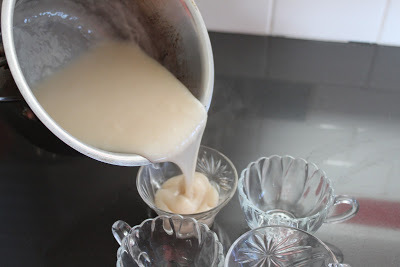 They either worked just as well as molds or were the cause of the impending disaster I will show you below.
They either worked just as well as molds or were the cause of the impending disaster I will show you below.
4. Allow to cool, then let set in the refrigerator for about 3 hours or until firm. Once done, they are ready to eat. I threw some cherry sauce over mine to make it prettier and give it a nice flavor. Cherry sauce is incredibly easy to make, so just hop on Google and pick one. I pretty much used this one, but withheld the cornstarch and used 1/3 cup of cane sugar for sweetener.
Now, generally, blancmange is set in molds, then inverted onto a pretty plate like so: I'm honestly not sure how this is possible. Maybe I didn't use enough arrowroot? Or maybe the above picture is lying and it's not real blancmange. I suspect the latter is true, as the internet is full of images of failed blancmange or blancmange simply left in their molds.
I'm honestly not sure how this is possible. Maybe I didn't use enough arrowroot? Or maybe the above picture is lying and it's not real blancmange. I suspect the latter is true, as the internet is full of images of failed blancmange or blancmange simply left in their molds.
Anyway, I tried to invert mine onto a plate, knowing full well that it wasn't going to work. I ended up creating what looks to be a distant cousin of the Blobfish (No, I didn't just make up that fish. They're real. Look them up): I think I would have made Jo proud.
I think I would have made Jo proud.
Anyway, I'm not sure exactly what blancmange tasted like, but this seemed pretty close to the real thing. It didn't taste very good, which, honestly, I wasn't really expecting it to. I mean, it's a descendant of foot jelly.
I never share recipes on here of foods that don't taste good, but I though I would today because: 1) I thought it was funny. 2) I do think that some people might like it. I personally don't enjoy jellies or puddings, so I can't judge this one accurately.
Have you ever had blancmange? Please tell me what you thought of it. And don't forget to tell me about your favorite sister from Little Women!
Related articles:
Rosa Hubermann's Pea Soup Inspired by The Book Thief
Tea with Tumnus from C.S. Lewis's The Lion, the Witch and the Wardrobe: Sardines on Toast, Madeira Cake, and Tea
Cherry Pop Inspired by Jack Schaefer's ShaneSaveSave
Enjoy this post? Take a look around. If you like what you see, please don't forget to subscribe by email for a new post every Friday!
My fictional twin is Jo March from Little Women . She's a tomboy, never quite fits in but doesn't usually mind, is a writer who works hard and dreams even harder, has a bad temper and a problem with saying things out loud that most people just keep locked up in their minds, wears her hair short, gets into trouble but generally is able to blunder her way back out, and has a good sense of humor.
Jo is pretty much me with the exception of our height (she got to be tall and I still struggle with reaching things on the top shelf) and our cooking skills (I can actually make pretty foods).
 Of course it's no surprise that Little Women was (and is) a favorite of mine. I grew up reading it and I'm always inspired by Jo and her fight for her writing career. In case you don't know what this story is (in which case....Christopher Columbus! What have you been doing with you life?), here's a brief synopsis:
Of course it's no surprise that Little Women was (and is) a favorite of mine. I grew up reading it and I'm always inspired by Jo and her fight for her writing career. In case you don't know what this story is (in which case....Christopher Columbus! What have you been doing with you life?), here's a brief synopsis:Meg, Jo, Beth, and Amy. These four sisters couldn't be more different: the elegant grown-up Meg, the tomboyish Jo, the musically inclined yet extremely shy Beth, and the impertinent Amy. They each have their own dreams and set backs, but when their father goes to fight in the Civl War, they work together with their mother to keep the house up and running. Whether they're putting on plays, braving different society circles, waiting to get published, or forming secret clubs, they are united in their desire to grow into women that will make their parents proud.
Funnily enough, as I sat down to write this post, I started thinking of all of the reasons I don't like this book. I'm sad that Beth died and will never get over the fact that Jo and Laurie didn't get married. WHY??? They could have made it work! Grrrr.
So I had to ask myself: Why on earth do you like this book? My answer to myself: Because it upset me.
I got so attached to the characters that the going ons in their lives affect me emotionally. I care about the book and the people in it because the writing is good and the characters are better. It's the kind of story that you can easily attach yourself too: laugh over it, cry over it, be inspired by it, and never ever forget it.
Basically, this is a story I love even while disliking parts of it. I'm assuming we all have a childhood book like that. Right? Right??
Anyway, I've always been curious about a food that appears in this book: Blancmange. It's a dish that Meg makes for Laurie when the March family hear he's sick. Jo takes it over to his house and explains that it slides down easily and is good for a sore throat.
 I've always wondered about this food because: 1) I have no idea what it is. 2) I have no idea how to pronounce it. 3) It seems to show up in almost all books written in the 1800s.
I've always wondered about this food because: 1) I have no idea what it is. 2) I have no idea how to pronounce it. 3) It seems to show up in almost all books written in the 1800s.Well, as it turns out, blancmange is a dairy and cornstarch pudding (usually vanilla flavored) and is pronounced "Blah-mahnj." Gotta love French.
It is of British origin, though it has a long history. At one point it had meat in it, then evolved into a pudding with the thickening agent being pigs feet (yum!), went meatless around the 1600s where eggs were used to thicken it, then, in the 1800s, arrowroot was used as the thickener. Arrowroot was later replaced with cornstarch.
Funnily enough, arrowroot is growing in popularity today and is used by a lot of hippy organic people like me. So I decided to make blancmange using arrowroot and almond milk. The idea is to have a pudding that is so thick that you can place it in a mold, set, then invert onto a plate with the pudding still holding itself in the correct shape. Mine? Well...we'll get to that part.
 Ingredients
Ingredients 2 cups of almond milk 1/3 cup of maple syrup4 tablespoons of arrowroot mixed with 4 tablespoons of almond milk1 teaspoon of vanilla. I actually forgot to put this vanilla in because I'm an idiot and always forget important things (did I mention I'm a lot like Jo?). So I suppose this technically makes the vanilla optional, though it is traditional. Directions
1. Heat milk and maple syrup in a medium saucepan until the syrup is dissolved.
2. Pour in the arrowroot mixture and whisk. Put heat on medium high. Bring to a boil, whisking continuously, and allow to boil for about one minute. The mixture should be fairly thick at this point. It should thickly coat the back of a spoon.
3. Pour the mixture into molds. I didn't have any of those pretty silicon molds, so I used glass punch bowls.
 They either worked just as well as molds or were the cause of the impending disaster I will show you below.
They either worked just as well as molds or were the cause of the impending disaster I will show you below. 4. Allow to cool, then let set in the refrigerator for about 3 hours or until firm. Once done, they are ready to eat. I threw some cherry sauce over mine to make it prettier and give it a nice flavor. Cherry sauce is incredibly easy to make, so just hop on Google and pick one. I pretty much used this one, but withheld the cornstarch and used 1/3 cup of cane sugar for sweetener.
Now, generally, blancmange is set in molds, then inverted onto a pretty plate like so:
 I'm honestly not sure how this is possible. Maybe I didn't use enough arrowroot? Or maybe the above picture is lying and it's not real blancmange. I suspect the latter is true, as the internet is full of images of failed blancmange or blancmange simply left in their molds.
I'm honestly not sure how this is possible. Maybe I didn't use enough arrowroot? Or maybe the above picture is lying and it's not real blancmange. I suspect the latter is true, as the internet is full of images of failed blancmange or blancmange simply left in their molds. Anyway, I tried to invert mine onto a plate, knowing full well that it wasn't going to work. I ended up creating what looks to be a distant cousin of the Blobfish (No, I didn't just make up that fish. They're real. Look them up):
 I think I would have made Jo proud.
I think I would have made Jo proud. Anyway, I'm not sure exactly what blancmange tasted like, but this seemed pretty close to the real thing. It didn't taste very good, which, honestly, I wasn't really expecting it to. I mean, it's a descendant of foot jelly.
I never share recipes on here of foods that don't taste good, but I though I would today because: 1) I thought it was funny. 2) I do think that some people might like it. I personally don't enjoy jellies or puddings, so I can't judge this one accurately.
Have you ever had blancmange? Please tell me what you thought of it. And don't forget to tell me about your favorite sister from Little Women!
Related articles:
Rosa Hubermann's Pea Soup Inspired by The Book Thief
Tea with Tumnus from C.S. Lewis's The Lion, the Witch and the Wardrobe: Sardines on Toast, Madeira Cake, and Tea
Cherry Pop Inspired by Jack Schaefer's ShaneSaveSave
Enjoy this post? Take a look around. If you like what you see, please don't forget to subscribe by email for a new post every Friday!

Published on December 30, 2016 06:08
December 23, 2016
Challenging Writers to Write Honestly
Writers have a tendency to hide behind their stories when they write. I get it. It's easier. Instead of saying, "Here's what I think," we get to say, "Here's what my character thinks." Instead of saying, "Here's how I feel," we get to show what our characters feel.
It's not as scary: When people peer at our stories and glimpse a real person inside of it, we can just say, "Oh, that's just my character come to life. Not me. Totally not me."
And there's something to be said for that. After all, characters shouldn't be carbon copies of their authors, nor should every single thought and feeling in a book be the exact thoughts and feelings of its creator.
HOWEVER. Sometimes authors get so caught up in hiding themselves that they hide everything else, too: genuine feelings, important thoughts, provoking ideas. They stuff away the parts of the story that matters in an attempt to help themselves feel safe.
But here's the thing: Writing isn't about feeling safe.
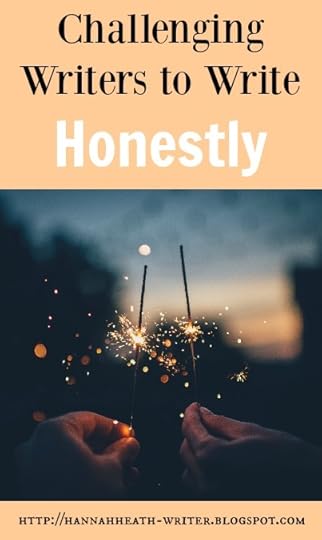 If you want to feel safe, then go park yourself behind a desk somewhere with a schedule and steady pay. There's nothing wrong with that. It's simply not what being a writer is about.
If you want to feel safe, then go park yourself behind a desk somewhere with a schedule and steady pay. There's nothing wrong with that. It's simply not what being a writer is about.
You shouldn't write to become rich and famous. That takes a long time and doesn't really benefit anyone, except possibly yourself if you are very lucky. You shouldn't write to tell people that the sky is blue. People could just look outside. You shouldn't write to only entertain mindlessly. There are thousands of apps that can do that, and that's about a thousand too many.
You should write because you have something to say. Because you have a message people need to hear, a problem to discuss, something beautiful to share. You write because you have a truth to tell.
Maybe it's your truth. Maybe it's the truth of a friend, or one that you saw on the news one day and just couldn't get out of your mind. Whatever it is, it's there. You can see it, and, because you have the words, it's up to you to make sure that others get a shot at seeing it, too.
But you can't do that unless you're willing to be honest: both with yourself and your readers.
Let me give you an example. I'm a Christian. I believe in Jesus Christ and I want others to, too. I also have Lyme disease, which means I'm in pain all of the time. And I see other people all around me who are in so many different kinds of pain: physical, mental, spiritual, emotional. And you know what? That bothers me. I don't understand why God is allowing that to happen.
But I'm not supposed to talk about that. Not if I want other people to believe in Jesus too. Right? Right???
Wrong. I am a Christian. And I am a writer. God has given me questions. And he has given me words. So it's up to me to write about the problems that I have within my own faith. No, I don't have answers. I wish I did. All I have is pain and anger, love and faith. So that's what I write about in my stories.
And it's hard, because I put these themes into my stories and I know: People can see me. They are reading about my struggles and thoughts and emotions, albeit in different forms and with slightly different takes. But that's me nonetheless.
This was a main concern of mine when I first started fiddling with the idea of Skies of Dripping Gold. I knew that, if I was going to write this story in a way that matters, I was going to have to take the pain and the anger and abandonment I felt because of my sickness and channel it into that story. I'd also have to infuse it with the desperate faith and confused hope I felt.
I thought: "This will be too much." Too much truth. I looked at both myself and my potential readers, my insides screaming:
[image error] But then I realized something: Why on earth wouldn't people be able to handle my truth? I couldn't possibly be the only person to struggle with believing in God in the midst of a broken world. And I had the idea that, perhaps, if people could see their struggles on paper, maybe they wouldn't feel so broken by their problems.
So I wrote the story. It hurt, because I had to thrust my hands deep into the darkness and stare directly at all of the ugly problems and scary questions that people like to pretend aren't there.
And you know what? It helped. It helped me with my own pain. It allowed myself (and some of my readers) to look at and fix the anger and fear we didn't think we were supposed to acknowledge. And that's when I decided: If I write, I will write honestly or not at all.
So you know those things that bother you? They aren't going to go away just because you won't acknowledge them in your writing. They're just going to sit inside of you and rankle, just as they sit inside of your readers and eat away at them.
You, as a writer, are not asked to have answers. You aren't expected to know everything or save everyone. You aren't Batman.
You are, however, expected to write truthfully about what matters. It is your job to explore ideas and topics honestly: Write about problems head on, explain beautiful truths so that people can see them clearly.
If you are a writer and don't pursue yours stories honestly, then what good are you? You'll provide some entertainment, maybe even provoke some thought. And then people will put down your book and you'll be gone from their mind. You will have made no difference, helped nobody. Not even yourself.
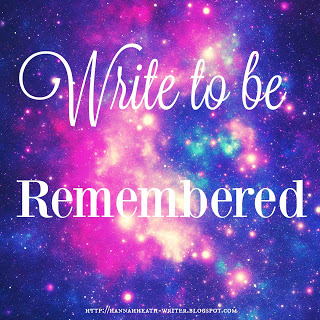 Do not write to be forgotten. Write to help, to expose, to love, to explore and fear and be courageous. Write to be remembered.
Do not write to be forgotten. Write to help, to expose, to love, to explore and fear and be courageous. Write to be remembered.
When you sit down before your story, you don't have to pretend. You don't have to make things look better or worse than they are. You don't have to be afraid of what people might think, afraid of whether or not you'll be able to get your point across, afraid of tearing open old wounds. You don't have to say what other people are saying. You just have to say what is true. And you have to say it honestly.
Write long and hard about whatever it is you know that others need to see. Maybe they won't understand it. But you know what? If you try your hardest, it doesn't matter. Because at least one person will see it: You. You have saved at least one person, and that is more than many will do in a lifetime.
What is it that you have to say that you haven't written before? I'm challenging you today: Write honestly. You were given this talent for a reason. You have the words, you have the means, you have the conviction. Do not let it go to waste.
Related articles:
Challenging Creative Writers To Be More Creative
Challenging Writers to Create Stories With Meaning
The Importances of Asking Why: 4 Questions You Should Ask Yourself as a Writer
Enjoy this post? Take a look around. If you like what you see, please don't forget to subscribe by email for a new post every Friday!
SaveSave
It's not as scary: When people peer at our stories and glimpse a real person inside of it, we can just say, "Oh, that's just my character come to life. Not me. Totally not me."
And there's something to be said for that. After all, characters shouldn't be carbon copies of their authors, nor should every single thought and feeling in a book be the exact thoughts and feelings of its creator.
HOWEVER. Sometimes authors get so caught up in hiding themselves that they hide everything else, too: genuine feelings, important thoughts, provoking ideas. They stuff away the parts of the story that matters in an attempt to help themselves feel safe.
But here's the thing: Writing isn't about feeling safe.
 If you want to feel safe, then go park yourself behind a desk somewhere with a schedule and steady pay. There's nothing wrong with that. It's simply not what being a writer is about.
If you want to feel safe, then go park yourself behind a desk somewhere with a schedule and steady pay. There's nothing wrong with that. It's simply not what being a writer is about.You shouldn't write to become rich and famous. That takes a long time and doesn't really benefit anyone, except possibly yourself if you are very lucky. You shouldn't write to tell people that the sky is blue. People could just look outside. You shouldn't write to only entertain mindlessly. There are thousands of apps that can do that, and that's about a thousand too many.
You should write because you have something to say. Because you have a message people need to hear, a problem to discuss, something beautiful to share. You write because you have a truth to tell.
Maybe it's your truth. Maybe it's the truth of a friend, or one that you saw on the news one day and just couldn't get out of your mind. Whatever it is, it's there. You can see it, and, because you have the words, it's up to you to make sure that others get a shot at seeing it, too.
But you can't do that unless you're willing to be honest: both with yourself and your readers.
Let me give you an example. I'm a Christian. I believe in Jesus Christ and I want others to, too. I also have Lyme disease, which means I'm in pain all of the time. And I see other people all around me who are in so many different kinds of pain: physical, mental, spiritual, emotional. And you know what? That bothers me. I don't understand why God is allowing that to happen.
But I'm not supposed to talk about that. Not if I want other people to believe in Jesus too. Right? Right???
Wrong. I am a Christian. And I am a writer. God has given me questions. And he has given me words. So it's up to me to write about the problems that I have within my own faith. No, I don't have answers. I wish I did. All I have is pain and anger, love and faith. So that's what I write about in my stories.
And it's hard, because I put these themes into my stories and I know: People can see me. They are reading about my struggles and thoughts and emotions, albeit in different forms and with slightly different takes. But that's me nonetheless.
This was a main concern of mine when I first started fiddling with the idea of Skies of Dripping Gold. I knew that, if I was going to write this story in a way that matters, I was going to have to take the pain and the anger and abandonment I felt because of my sickness and channel it into that story. I'd also have to infuse it with the desperate faith and confused hope I felt.
I thought: "This will be too much." Too much truth. I looked at both myself and my potential readers, my insides screaming:
[image error] But then I realized something: Why on earth wouldn't people be able to handle my truth? I couldn't possibly be the only person to struggle with believing in God in the midst of a broken world. And I had the idea that, perhaps, if people could see their struggles on paper, maybe they wouldn't feel so broken by their problems.
So I wrote the story. It hurt, because I had to thrust my hands deep into the darkness and stare directly at all of the ugly problems and scary questions that people like to pretend aren't there.
And you know what? It helped. It helped me with my own pain. It allowed myself (and some of my readers) to look at and fix the anger and fear we didn't think we were supposed to acknowledge. And that's when I decided: If I write, I will write honestly or not at all.
So you know those things that bother you? They aren't going to go away just because you won't acknowledge them in your writing. They're just going to sit inside of you and rankle, just as they sit inside of your readers and eat away at them.
You, as a writer, are not asked to have answers. You aren't expected to know everything or save everyone. You aren't Batman.
You are, however, expected to write truthfully about what matters. It is your job to explore ideas and topics honestly: Write about problems head on, explain beautiful truths so that people can see them clearly.
If you are a writer and don't pursue yours stories honestly, then what good are you? You'll provide some entertainment, maybe even provoke some thought. And then people will put down your book and you'll be gone from their mind. You will have made no difference, helped nobody. Not even yourself.
 Do not write to be forgotten. Write to help, to expose, to love, to explore and fear and be courageous. Write to be remembered.
Do not write to be forgotten. Write to help, to expose, to love, to explore and fear and be courageous. Write to be remembered.When you sit down before your story, you don't have to pretend. You don't have to make things look better or worse than they are. You don't have to be afraid of what people might think, afraid of whether or not you'll be able to get your point across, afraid of tearing open old wounds. You don't have to say what other people are saying. You just have to say what is true. And you have to say it honestly.
Write long and hard about whatever it is you know that others need to see. Maybe they won't understand it. But you know what? If you try your hardest, it doesn't matter. Because at least one person will see it: You. You have saved at least one person, and that is more than many will do in a lifetime.
What is it that you have to say that you haven't written before? I'm challenging you today: Write honestly. You were given this talent for a reason. You have the words, you have the means, you have the conviction. Do not let it go to waste.
Related articles:
Challenging Creative Writers To Be More Creative
Challenging Writers to Create Stories With Meaning
The Importances of Asking Why: 4 Questions You Should Ask Yourself as a Writer
Enjoy this post? Take a look around. If you like what you see, please don't forget to subscribe by email for a new post every Friday!
SaveSave

Published on December 23, 2016 05:58
December 16, 2016
7 Tips for Writing in Deep POV
There's nothing better than getting lost in a good book. Except maybe finding true love. Or a nice MLT: mutton, lettuce, and tomato sandwich, where the mutton is nice and lean and the tomato is ripe. They’re so perky, I love that.
Anyway.
Getting lost in good book. That's something that readers love, and something that writers strive for. There are a lot of different ways an author can go about making sure that their reader gets lost in their story (lost in a good way...not a creepy Court-of-Owls-maze kind of way).
A personal favorite of mine is writing in Deep point of view (POV). This is the epitome of showing rather than telling. We see the story from inside of another character: we feel their emotions, see what they see, think what they think. It's as if we've crawled into the character's skin and are allowed to live there for a little while.
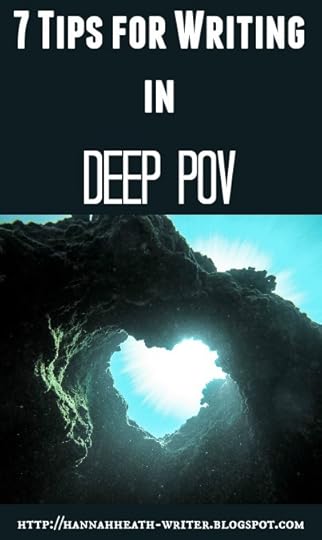 It can sometimes be an exhausting form of writing, and it often takes a while to lock yourself into that mode. But once you get it? You're in. And ready to conquer the literary world.
It can sometimes be an exhausting form of writing, and it often takes a while to lock yourself into that mode. But once you get it? You're in. And ready to conquer the literary world.
Unfortunately, it can take a bit of work to get to that point. As my current WIP is written in Deep POV, I've found some ways to stay firmly in that perspective while writing. But first, let's explain what exactly deep POV is:
What is Deep POV?Allow me to provide you with two excellent paragraphs. They will have the same high-stakes storyline, but one is in Deep POV and one is not. Read:
Margaret clenched her fist, feeling her nails biting into her palm. Noticing the squirrel inching forward towards her MLT sandwich, she watched as its nose twitched, revealing its sharp yellow teeth. With a panicked jolt, she realized that it meant to steal her lunch. Looking around for a weapon, she saw a water bottle. Snatching it up and letting out an angry cry, she rushed forward to save her MLT. She would not let the squirrel win.
OR:
Margaret's nails bit into her palm as her hand clenched into a fist. The squirrel inched towards her MLT sandwich, its nose twitching, yellow teeth bared. Her heart thumped, sending jolts of electricity through her limbs. This squirrel meant to steal her lunch. Snatching up a nearby water bottle, its metal cold and hard in her hand, she brandished it above her head, blood on fire as she screeched out a battle cry. This squirrel would not win.
Which one do you think is a in Deep POV? Go on. Guess.
That's right. The second one is in Deep POV. It shows us what Margaret is thinking and feeling by allowing us to experience her emotions.
That, essentially, is what Deep POV is. It takes the "show don't tell" rule almost as far is it can go, it removes the author from the entire picture, and limits the narrative to one character at a time. It is tight, concise, and emotional.
How Do You Write in Deep POV?1. Show me! Don't listen to Loki, no matter how much he screams at you.
 Do NOT tell me. Show me. Show me what the characters are going through: Let me feel the way their blood is pumping, show me how their hands are shaking, make me happy when they are happy and sad when they are sad. Showing should be in the here and now, exploring thoughts and actions and emotions and senses. No info dumping or long descriptions of people, places, or events.
Do NOT tell me. Show me. Show me what the characters are going through: Let me feel the way their blood is pumping, show me how their hands are shaking, make me happy when they are happy and sad when they are sad. Showing should be in the here and now, exploring thoughts and actions and emotions and senses. No info dumping or long descriptions of people, places, or events.
2. Cut the thought and sense words. The what? Words like: Thought, realized, felt, saw, noticed. Also avoid naming emotions rather than describing them. Below, all of these no-no words are highlighted in red.
Margaret clenched her fist, feeling her nails biting into her palm. Noticing the squirrel inching forward towards her MLT sandwich, she watched as its nose twitched, revealing its sharp yellow teeth. With a panicked jolt, she realized that it meant to steal her lunch. Looking around for a weapon, she saw a water bottle. Snatching it up and letting out an angry cry, she rushed forward to save her MLT. She would not let the squirrel win.
3. Get out of town. And stay out. You, as the author, should not be in the picture at all. Your reader should not notice you are there. All they need to see is the character. For example:
She would not let the squirrel win. vs This squirrel would not win.
The former sentence is not in Deep POV because I, the author, am telling you what the character is thinking. The latter sentence is all coming from Margaret, the character. That's what you're going for. You'll also want to avoid dialogue tags such as: said, asked, whispered, screamed. Instead, try dialogue with no tags at all (this usually only works when there are only two characters present) or with attributive tags (Her lips curled. "I despise squirrels.")
4. Avoid the passive voice. Don't know what this is? I can explain it fairly simply. And I can do it while remaining in keeping with my evil squirrel theme (I'm in too deep to stop now. Send help).
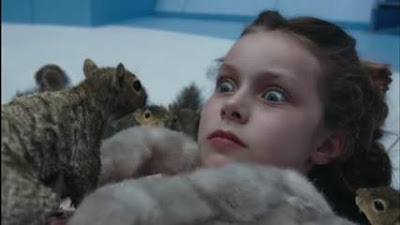 I really don't like this movie. But the picture fit, so there you have it.If you can put "by squirrels" at the end of your sentence and it still makes sense: It's passive.
I really don't like this movie. But the picture fit, so there you have it.If you can put "by squirrels" at the end of your sentence and it still makes sense: It's passive.
A decision was made....by squirrels. My MLT sandwich is being eaten...by squirrels. I will be murdered...by squirrels.
Got it? Don't use a passive voice. It will pull people out of your story.
5. Be careful with description. A good way to make readers remember that they're reading a story is to use too many words or to take a moment to describe something out of the ordinary. For example: in Deep POV, you can only describe things that your character would notice in the exact way that that character would notice it. Your mercenary may not notice the stylish heels that lady has on, but he may notice how un-calloused her hands are. Your maiden warrior may notice the heels, but only how they make the lady teeter, not how stylish they are.
6. Keep it personal and vivid. Everything is up close and in-your-face. You want your readers to feel as connected as possible to your character and his/her emotions. So keep everything tight and tense and real. If you as the writer do not feel emotion as your write from a Deep POV (or read over the scenes), then you probably aren't going deep enough.
7. Use anchor words, images, or songs. It can be hard to keep from slipping out of deep POV....Or, if you are writing from more than one character's POV, it can be hard to keep each narrative unique to the character. That's what anchors are for: words, images (via Pinterest or a cork board on your wall), songs, or colors that convey the emotions, thoughts, and actions that are essential to your POV character. If you find yourself getting mixed up or unable to fully lock into their minds, go through these. It will help you orient yourself and allows you to fully submerge into their POV. This then allows you to write from inside of them, rather than to write as the author (thus breaking tip #3).
Writing in Deep POV requires a deep understanding of your characters, as well as the ability to get inside of your character's head. It takes time and practice, but it gets easier the more you do it. So if you find yourself slipping up at first and reverting to an omniscient or shallow narrative: Don't worry. It will come. Just keep trying.
Do you write in Deep POV? What are some of your favorite books that are written in a Deep POV? I'd love to hear your thoughts!
Related articles:
7 Tips for Writing Emotion Into Your Story
7 Tips for Choosing Your Character's Appearance
8 Tips to Improve Your Descriptive Writing
Enjoy this post? Please share on social media and take a look around. If you like what you see, don't forget to subscribe by email for a new post every Friday!
Anyway.
Getting lost in good book. That's something that readers love, and something that writers strive for. There are a lot of different ways an author can go about making sure that their reader gets lost in their story (lost in a good way...not a creepy Court-of-Owls-maze kind of way).
A personal favorite of mine is writing in Deep point of view (POV). This is the epitome of showing rather than telling. We see the story from inside of another character: we feel their emotions, see what they see, think what they think. It's as if we've crawled into the character's skin and are allowed to live there for a little while.
 It can sometimes be an exhausting form of writing, and it often takes a while to lock yourself into that mode. But once you get it? You're in. And ready to conquer the literary world.
It can sometimes be an exhausting form of writing, and it often takes a while to lock yourself into that mode. But once you get it? You're in. And ready to conquer the literary world.Unfortunately, it can take a bit of work to get to that point. As my current WIP is written in Deep POV, I've found some ways to stay firmly in that perspective while writing. But first, let's explain what exactly deep POV is:
What is Deep POV?Allow me to provide you with two excellent paragraphs. They will have the same high-stakes storyline, but one is in Deep POV and one is not. Read:
Margaret clenched her fist, feeling her nails biting into her palm. Noticing the squirrel inching forward towards her MLT sandwich, she watched as its nose twitched, revealing its sharp yellow teeth. With a panicked jolt, she realized that it meant to steal her lunch. Looking around for a weapon, she saw a water bottle. Snatching it up and letting out an angry cry, she rushed forward to save her MLT. She would not let the squirrel win.
OR:
Margaret's nails bit into her palm as her hand clenched into a fist. The squirrel inched towards her MLT sandwich, its nose twitching, yellow teeth bared. Her heart thumped, sending jolts of electricity through her limbs. This squirrel meant to steal her lunch. Snatching up a nearby water bottle, its metal cold and hard in her hand, she brandished it above her head, blood on fire as she screeched out a battle cry. This squirrel would not win.
Which one do you think is a in Deep POV? Go on. Guess.
That's right. The second one is in Deep POV. It shows us what Margaret is thinking and feeling by allowing us to experience her emotions.
That, essentially, is what Deep POV is. It takes the "show don't tell" rule almost as far is it can go, it removes the author from the entire picture, and limits the narrative to one character at a time. It is tight, concise, and emotional.
How Do You Write in Deep POV?1. Show me! Don't listen to Loki, no matter how much he screams at you.
 Do NOT tell me. Show me. Show me what the characters are going through: Let me feel the way their blood is pumping, show me how their hands are shaking, make me happy when they are happy and sad when they are sad. Showing should be in the here and now, exploring thoughts and actions and emotions and senses. No info dumping or long descriptions of people, places, or events.
Do NOT tell me. Show me. Show me what the characters are going through: Let me feel the way their blood is pumping, show me how their hands are shaking, make me happy when they are happy and sad when they are sad. Showing should be in the here and now, exploring thoughts and actions and emotions and senses. No info dumping or long descriptions of people, places, or events.2. Cut the thought and sense words. The what? Words like: Thought, realized, felt, saw, noticed. Also avoid naming emotions rather than describing them. Below, all of these no-no words are highlighted in red.
Margaret clenched her fist, feeling her nails biting into her palm. Noticing the squirrel inching forward towards her MLT sandwich, she watched as its nose twitched, revealing its sharp yellow teeth. With a panicked jolt, she realized that it meant to steal her lunch. Looking around for a weapon, she saw a water bottle. Snatching it up and letting out an angry cry, she rushed forward to save her MLT. She would not let the squirrel win.
3. Get out of town. And stay out. You, as the author, should not be in the picture at all. Your reader should not notice you are there. All they need to see is the character. For example:
She would not let the squirrel win. vs This squirrel would not win.
The former sentence is not in Deep POV because I, the author, am telling you what the character is thinking. The latter sentence is all coming from Margaret, the character. That's what you're going for. You'll also want to avoid dialogue tags such as: said, asked, whispered, screamed. Instead, try dialogue with no tags at all (this usually only works when there are only two characters present) or with attributive tags (Her lips curled. "I despise squirrels.")
4. Avoid the passive voice. Don't know what this is? I can explain it fairly simply. And I can do it while remaining in keeping with my evil squirrel theme (I'm in too deep to stop now. Send help).
 I really don't like this movie. But the picture fit, so there you have it.If you can put "by squirrels" at the end of your sentence and it still makes sense: It's passive.
I really don't like this movie. But the picture fit, so there you have it.If you can put "by squirrels" at the end of your sentence and it still makes sense: It's passive.A decision was made....by squirrels. My MLT sandwich is being eaten...by squirrels. I will be murdered...by squirrels.
Got it? Don't use a passive voice. It will pull people out of your story.
5. Be careful with description. A good way to make readers remember that they're reading a story is to use too many words or to take a moment to describe something out of the ordinary. For example: in Deep POV, you can only describe things that your character would notice in the exact way that that character would notice it. Your mercenary may not notice the stylish heels that lady has on, but he may notice how un-calloused her hands are. Your maiden warrior may notice the heels, but only how they make the lady teeter, not how stylish they are.
6. Keep it personal and vivid. Everything is up close and in-your-face. You want your readers to feel as connected as possible to your character and his/her emotions. So keep everything tight and tense and real. If you as the writer do not feel emotion as your write from a Deep POV (or read over the scenes), then you probably aren't going deep enough.
7. Use anchor words, images, or songs. It can be hard to keep from slipping out of deep POV....Or, if you are writing from more than one character's POV, it can be hard to keep each narrative unique to the character. That's what anchors are for: words, images (via Pinterest or a cork board on your wall), songs, or colors that convey the emotions, thoughts, and actions that are essential to your POV character. If you find yourself getting mixed up or unable to fully lock into their minds, go through these. It will help you orient yourself and allows you to fully submerge into their POV. This then allows you to write from inside of them, rather than to write as the author (thus breaking tip #3).
Writing in Deep POV requires a deep understanding of your characters, as well as the ability to get inside of your character's head. It takes time and practice, but it gets easier the more you do it. So if you find yourself slipping up at first and reverting to an omniscient or shallow narrative: Don't worry. It will come. Just keep trying.
Do you write in Deep POV? What are some of your favorite books that are written in a Deep POV? I'd love to hear your thoughts!
Related articles:
7 Tips for Writing Emotion Into Your Story
7 Tips for Choosing Your Character's Appearance
8 Tips to Improve Your Descriptive Writing
Enjoy this post? Please share on social media and take a look around. If you like what you see, don't forget to subscribe by email for a new post every Friday!

Published on December 16, 2016 06:21
December 9, 2016
14 Signs That You Are Turning Into a Writer
Becoming a writer is a lot like joining a fandom. You think, "Oh, hey. This looks fun. I'll give it a shot!" Then, before you know it, you're sucked into a brand new world full of crazy ideas, sad stories, and insane people. And there's no way out.
Becoming a writer isn't really something you do, it's something you catch. Like the measles. Except there isn't a cure, and you'll spend half of your time wishing there was and the other half you'll spend having the time of your life.
That being said, it can be a nasty shock to wake up in the morning as a Writer. It'd be nice if you could ease into it, right? Spot the symptoms so you have time to prepare.
Well, luckily you can. All you have to do is learn to read the stars and watch for signs of impending writing. Or, if you're lazy, you can just read the below list:
 1. You drink caffeine. All of the caffeine. Most writers take theirs in the form of coffee, though some (like myself) prefer black tea. You may consume energy drinks, but it's generally understood to be more writerly if you're sipping something warm from a mug rather than chugging liquid from a can. Using some kind of cool or nerdy mug is optional, but recommended.
1. You drink caffeine. All of the caffeine. Most writers take theirs in the form of coffee, though some (like myself) prefer black tea. You may consume energy drinks, but it's generally understood to be more writerly if you're sipping something warm from a mug rather than chugging liquid from a can. Using some kind of cool or nerdy mug is optional, but recommended.
[image error]
2. You know tons of words, but mispronounce a large fraction of them. Because you've read tons of novels and puttered at creating your own, you have a brain full of interesting words. You know how to spell words like "beneficence," "sophist," and "jocoseness," but you settle for easier synonyms when speaking because what are the chances that you'll say them correctly?
3. You suffer from crippling self doubt. Questioning yourself, your talents, and your reason for existence upon a regular basis is just part of your routine. But...
4. You keep grasping at your dreams anyway. Because you have a story inside of you and you think maybe, just maybe, somebody might need to read it someday. And that's reason enough to keep trying to write, right? Right??
5. You like to eavesdrop. There's no shame in this. Unless you get caught. Or try to blackmail somebody with information you overheard. In which case: Yes. Shame on you. Shame on your cow. But, generally, eavesdropping and people watching is enjoyable to you. People say the most interesting things and can provide multiple sparks of inspiration.
6. Your people skills are questionable. Listening in on conversations? Yes please! Actually being part of a conversation? Ew. I mean, sure. You can get along with people and even pass yourself off as a regular human being. But sometimes you have to reign yourself in. Like when somebody asks, "Oh, do you like to read?" and you have to say, "Oh, yeah. I really do." Rather than screaming, "jieoajdoajo;a! YES. YES!! I have a ton of bookshelves and a kindle and I read all of the time and do you like this book? You do?? Oh my gosh! That character is the BEST!" You'd probably yell all of this while imitating an excited Merida.
 Unfortunately, that reaction tends to make people slowly inch away from you and towards a phone, so you've had to cut back. Some people just can't handle awesomeness.
Unfortunately, that reaction tends to make people slowly inch away from you and towards a phone, so you've had to cut back. Some people just can't handle awesomeness.
7. You see stories everywhere. And I mean everywhere. On the street corner, driving along the freeway, watching the trees wave in the breeze, seeing a pretty rock on the ground. The world is full of stories and they're all shouting for your attention.
8. You tend to space out a lot. Which is unfortunate. Because then you'll have missed that important piece of information you professor just gave out. Or you'll find your friend has come the end of their story and is asking you "So, what should I do?" and you have to figure out how to worm your way out of the situation. But sometimes your brain is more exciting than your external surroundings. However...
9. When you pay attention, you pay attention. When you aren't being distracted by something else, you are a good listener and a good observer. Like Sherlock Holmes level of attention to detail. Because who knows? There might be a good story in this somewhere.
10. You like wikipedia. Okay, so maybe you're one of the few people who knows about armadillo girdled lizards or the history of gun powder. But that information may come in handy one day. Operative word being "may." And even if if it doesn't, it's still fascinating.
11. People around you ask for help writing things or spelling things. Because you have "writer" stamped all over you and everyone except for yourself recognizes your flair for words.
12. You are either very organized or very not-organized. There is a place for everything and everything is in it's place. You probably have an organizer and multiple journals. Outlines appeal to you, as do spreadsheets and carefully managed time. OR: your room is in chaos, you have sticky notes stuck to random walls, and ideas written on the palm of your hand. You live like a hippy and schedules and order kill your soul. I'm the latter, just in case you can't tell from the state of my room:

13. You are obsessed with odd things. When you like something, you like something all. the. way. You obsess and get absurdly excited, usually over things that other people don't get. Like a minor character from an obscure series. Or Chopin's etudes. Of the Valar from LOTR. Or all things related to Batman '66. Or sans serif font. Or Itty Bittys. You like them. Maybe they're weird, but you like them and they make you happy, so who cares if you go a bit overboard?
14. You love stories. A lot. Books, movies, songs. You spend your time delving into them, trying to learn, soak up new ideas, go on adventures, feel that spark of something excited and happy inside that pops up whenever you're around a good tale.
If you identify with an alarming amount of these, then you're probably turning into a Writer....Or have already become one. At least now you know.
Don't try to argue with me. Don't talk like one of them. You're not. Even if you'd like to be. We both know it's the truth. It's time to stop trying to fit yourself into the "non-writer" box. Let it go.
I'm not gonna lie about the ramifications of this discovery. Friends don't lie. So here's the truth: Being a writer is hard. And scary.
And completely and utterly awesome.
You have a story and a voice like no other. So go for it. Complete the metamorphosis. I may be biased, but the grass is greener over here. In fact, it's not even green. It's all sorts of beautiful colors, and it always smells like dew and sunshine. And there are unicorns. So come on over. We're excited to have you.
Related articles:
10 Things Nobody Tells You About Being A Writer...Until It's Too Late
10 Reasons Why Writers Aren't The Weird Ones
Inside the Creative's Mind: 9 Things You Should Know
Enjoy this post? Take a look around! If you like what you see, subscribe by email for a new post every Friday!
Some links are Amazon Affiliate. Thank you for your support!
Becoming a writer isn't really something you do, it's something you catch. Like the measles. Except there isn't a cure, and you'll spend half of your time wishing there was and the other half you'll spend having the time of your life.
That being said, it can be a nasty shock to wake up in the morning as a Writer. It'd be nice if you could ease into it, right? Spot the symptoms so you have time to prepare.
Well, luckily you can. All you have to do is learn to read the stars and watch for signs of impending writing. Or, if you're lazy, you can just read the below list:
 1. You drink caffeine. All of the caffeine. Most writers take theirs in the form of coffee, though some (like myself) prefer black tea. You may consume energy drinks, but it's generally understood to be more writerly if you're sipping something warm from a mug rather than chugging liquid from a can. Using some kind of cool or nerdy mug is optional, but recommended.
1. You drink caffeine. All of the caffeine. Most writers take theirs in the form of coffee, though some (like myself) prefer black tea. You may consume energy drinks, but it's generally understood to be more writerly if you're sipping something warm from a mug rather than chugging liquid from a can. Using some kind of cool or nerdy mug is optional, but recommended.[image error]

2. You know tons of words, but mispronounce a large fraction of them. Because you've read tons of novels and puttered at creating your own, you have a brain full of interesting words. You know how to spell words like "beneficence," "sophist," and "jocoseness," but you settle for easier synonyms when speaking because what are the chances that you'll say them correctly?
3. You suffer from crippling self doubt. Questioning yourself, your talents, and your reason for existence upon a regular basis is just part of your routine. But...
4. You keep grasping at your dreams anyway. Because you have a story inside of you and you think maybe, just maybe, somebody might need to read it someday. And that's reason enough to keep trying to write, right? Right??
5. You like to eavesdrop. There's no shame in this. Unless you get caught. Or try to blackmail somebody with information you overheard. In which case: Yes. Shame on you. Shame on your cow. But, generally, eavesdropping and people watching is enjoyable to you. People say the most interesting things and can provide multiple sparks of inspiration.
6. Your people skills are questionable. Listening in on conversations? Yes please! Actually being part of a conversation? Ew. I mean, sure. You can get along with people and even pass yourself off as a regular human being. But sometimes you have to reign yourself in. Like when somebody asks, "Oh, do you like to read?" and you have to say, "Oh, yeah. I really do." Rather than screaming, "jieoajdoajo;a! YES. YES!! I have a ton of bookshelves and a kindle and I read all of the time and do you like this book? You do?? Oh my gosh! That character is the BEST!" You'd probably yell all of this while imitating an excited Merida.
 Unfortunately, that reaction tends to make people slowly inch away from you and towards a phone, so you've had to cut back. Some people just can't handle awesomeness.
Unfortunately, that reaction tends to make people slowly inch away from you and towards a phone, so you've had to cut back. Some people just can't handle awesomeness.7. You see stories everywhere. And I mean everywhere. On the street corner, driving along the freeway, watching the trees wave in the breeze, seeing a pretty rock on the ground. The world is full of stories and they're all shouting for your attention.
8. You tend to space out a lot. Which is unfortunate. Because then you'll have missed that important piece of information you professor just gave out. Or you'll find your friend has come the end of their story and is asking you "So, what should I do?" and you have to figure out how to worm your way out of the situation. But sometimes your brain is more exciting than your external surroundings. However...
9. When you pay attention, you pay attention. When you aren't being distracted by something else, you are a good listener and a good observer. Like Sherlock Holmes level of attention to detail. Because who knows? There might be a good story in this somewhere.
10. You like wikipedia. Okay, so maybe you're one of the few people who knows about armadillo girdled lizards or the history of gun powder. But that information may come in handy one day. Operative word being "may." And even if if it doesn't, it's still fascinating.
11. People around you ask for help writing things or spelling things. Because you have "writer" stamped all over you and everyone except for yourself recognizes your flair for words.
12. You are either very organized or very not-organized. There is a place for everything and everything is in it's place. You probably have an organizer and multiple journals. Outlines appeal to you, as do spreadsheets and carefully managed time. OR: your room is in chaos, you have sticky notes stuck to random walls, and ideas written on the palm of your hand. You live like a hippy and schedules and order kill your soul. I'm the latter, just in case you can't tell from the state of my room:

13. You are obsessed with odd things. When you like something, you like something all. the. way. You obsess and get absurdly excited, usually over things that other people don't get. Like a minor character from an obscure series. Or Chopin's etudes. Of the Valar from LOTR. Or all things related to Batman '66. Or sans serif font. Or Itty Bittys. You like them. Maybe they're weird, but you like them and they make you happy, so who cares if you go a bit overboard?
14. You love stories. A lot. Books, movies, songs. You spend your time delving into them, trying to learn, soak up new ideas, go on adventures, feel that spark of something excited and happy inside that pops up whenever you're around a good tale.
If you identify with an alarming amount of these, then you're probably turning into a Writer....Or have already become one. At least now you know.
Don't try to argue with me. Don't talk like one of them. You're not. Even if you'd like to be. We both know it's the truth. It's time to stop trying to fit yourself into the "non-writer" box. Let it go.
I'm not gonna lie about the ramifications of this discovery. Friends don't lie. So here's the truth: Being a writer is hard. And scary.
And completely and utterly awesome.
You have a story and a voice like no other. So go for it. Complete the metamorphosis. I may be biased, but the grass is greener over here. In fact, it's not even green. It's all sorts of beautiful colors, and it always smells like dew and sunshine. And there are unicorns. So come on over. We're excited to have you.
Related articles:
10 Things Nobody Tells You About Being A Writer...Until It's Too Late
10 Reasons Why Writers Aren't The Weird Ones
Inside the Creative's Mind: 9 Things You Should Know
Enjoy this post? Take a look around! If you like what you see, subscribe by email for a new post every Friday!
Some links are Amazon Affiliate. Thank you for your support!

Published on December 09, 2016 06:45
December 2, 2016
Why Not All Prologues Are Evil (And How to Write A Good One)
Prologues should be like John the Baptist. Awesome, intriguing, paving the way for an even greater written work.
But most of the time they aren't. They're more like those dreaded "Previously on" pieces of dialogue that come before a TV show that you usually end up forwarding through.
Prologues have accumulated a lot of hate over the years. People say they're too boring. They're info dumping. They're not necessary, they're too long, they're too short, they're outdated, annoying, they lower your chances of publication by 394%.
Pffft. You're not actually going to listen to those fools, are you? I bet they're the same people who laughed at Edison and said that the Guardians of the Galaxy was going to be stupid.
 Allow me to explain to you all of the brilliant things about prologues:
Allow me to explain to you all of the brilliant things about prologues:
They set the mood and background of the story. It allows you to set the mood and the style of your world, people, society, conflict, etc by giving information in a way that is different from what you could have done with just a chapter. If you don't go overkill and drown your reader in backstory, this is a great capability to have. They allow you to write from a different time period. You can set your prologue several years in the past, which is not as easy to do if your opening pages are within a chapter. This can help you set the stage. They allow you to write from a different point of view. This lends a flexibility to the story, as it allows you to tell what is going on in a place (or a character's head) that is not generally accessible when using another POV. They can tease the reader into the story. You can showcase your awesome style, give bits and pieces of your world away, and show your readers glances of the coming plot and conflict. Prologues are a great way to build tension and understanding of the story right out of the gate. I personally have always loved a good prologue. If you're thinking of using one in your book, or perhaps already have one but are thinking of backing out because of all of the stigma surrounding them, then you're in the right place. I don't care if everybody is looking at something in your story and screaming: I don't care if it's not popular. All that matters to me is whether of not it can make a good story. Prologues can and do. So don't listen to the naysayers. Follow me. I can show you the ways of the prologue, and how to craft one that readers will enjoy:
I don't care if it's not popular. All that matters to me is whether of not it can make a good story. Prologues can and do. So don't listen to the naysayers. Follow me. I can show you the ways of the prologue, and how to craft one that readers will enjoy:
1. Ask yourself whether you need it. Is this prologue necessary? What are you going to use it for? Is it something that can't be placed in chapter form (or sprinkled throughout several chapters) in a pleasing manner? Make sure you need it. Once you have decided that your book needs it, then it doesn't matter if the publishing and writing industry is telling you to change, to move your prologue to the trash. It is your duty to plant yourself like a tree, look them in the eye and say, no. You move.
2. Decide exactly what it is you need in your prologue before writing. Do not sit down at that keyboard before having chosen exactly what information it is you are going to put in your prologue. It needs to be relevant to the story, it needs to be interesting, and it needs to make your readers care. So keep your information concise, clear, and cool. Alliterations are optional.
3. Remember that your prologue can have dialogue. I'm not sure why this is, but many prologues are utterly void of dialogue. They don't have to be. In fact, dialogue can keep your prologue from being one of those scary blocks of text with very few spaces. Just keep the dialogue natural and allow it to have subtleties and nuances.
4. Try to keep it short. Traditionally, prologues are kept under five pages. If your prologue is extremely long, people may get bored and wonder when the "real story" begins. Also, if it's long it's possible that you are info-dumping, which is a massive no. So try to keep it brief. If you need it longer and know you can do it without being boring or monologuing or breaking tip #2, then okay. I will cheer you on.
5. Don't be afraid to write it from your villain's POV. Yep. I said it. You can open your book with a prologue, and you can open it from your villain's POV. Break two rules at once! Yay! Join the rebellion.
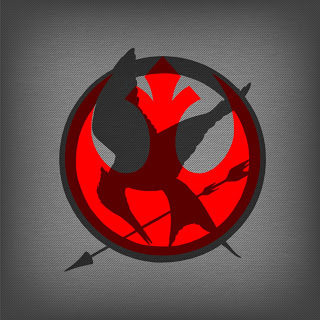 Think about it: It will help with your villain's complexity and it's a good way to convey tension and the conflict to come. I'm not saying you need to open your book with your villain, but if you feel so inclined, then full speed ahead!
Think about it: It will help with your villain's complexity and it's a good way to convey tension and the conflict to come. I'm not saying you need to open your book with your villain, but if you feel so inclined, then full speed ahead!
6. Don't you dare info dump. Don't even think about it. If you do, you will become part of the group of writers who are responsible for all of the prologue-haters out there. You will make the lives of us good-prologue-writers infinitely more difficult. Nobody will publish your book, nobody will read it. You will be rejected by your readers, the publishing industry, your fellow writers who you've made life hard for. We will hunt you down and drive you out. You will find yourself huddled beneath a bridge, coffee-less and wifi-less and cursing your stupidity. Sounds bad, right? That's because it is. So don't info dump. Thank you.
7. Pull out all the stops. You know how you read about the importance of writing a really, really good first chapter? The same rule applies to prologues, only multiplied by ten. Because prologues are considered bad, you need to do everything in your power to prove that wrong. Write beautifully. Be intriguing. Craft your prologue with flair.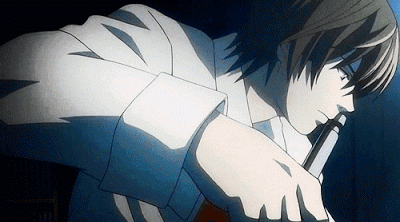 Make ever sentence necessary, make every paragraph flow, make the prologue your masterpiece.
Make ever sentence necessary, make every paragraph flow, make the prologue your masterpiece.
8. Go watch some movies and read a good prologue. Prologues are abundant in movies, and many of them are very well done. Marvel does some darn good prologues, as did The Fellowship of the Ring, The Dark Knight, Fiddler on the Roof, John Carter. Go study them, see what techniques are used, notice what works and what doesn't. Then try to apply that to your writing. You can also read some well-done prologues. My personal favorite is from The Name of the Wind. It's what made me fall in love with the book.
9. Write it as a prologue and title it Chapter 1. I know it seems weird, and it certainly doesn't work for every prologue. In fact, I'm not even recommending that most people do this. However, if it works with your book and if you're afraid of people skipping your prologue simply because it's titled "prologue," then it's worth a shot. This is what J.K. Rowling did in Harry Potter and the Sorcerer's Stone . Don't believe me? Go read it. It is 100% a prologue: It takes place years before the story begins, gives valuable background information, and is written from a different POV than the rest of the series. It is a chapter in name only. But it works. Test this idea out. If it fits, feel free to run with it. Your book. Your rules.
Prologues can be amazing. They can be beautiful and well-written and a wonderful set up for the rest of the book. Don't be afraid of them.
Still not sure if you should put a prologue in your story? Leave a comment below with questions, concerns, or your own tips for writing a killer prologue! And don't forget to tell me about some of the best prologues you've ever read!
Related articles:
The 10 Commandments of Writing
8 Tips for Developing a Strong Theme in Your Novel
Why Writers Should Strive to be More Like Batman
Enjoy this post? Take a look around! If you like what you see, subscribe by email for a new post every Friday!
Some links are Amazon Affiliate. Thank you for your support!
But most of the time they aren't. They're more like those dreaded "Previously on" pieces of dialogue that come before a TV show that you usually end up forwarding through.
Prologues have accumulated a lot of hate over the years. People say they're too boring. They're info dumping. They're not necessary, they're too long, they're too short, they're outdated, annoying, they lower your chances of publication by 394%.
Pffft. You're not actually going to listen to those fools, are you? I bet they're the same people who laughed at Edison and said that the Guardians of the Galaxy was going to be stupid.
 Allow me to explain to you all of the brilliant things about prologues:
Allow me to explain to you all of the brilliant things about prologues:They set the mood and background of the story. It allows you to set the mood and the style of your world, people, society, conflict, etc by giving information in a way that is different from what you could have done with just a chapter. If you don't go overkill and drown your reader in backstory, this is a great capability to have. They allow you to write from a different time period. You can set your prologue several years in the past, which is not as easy to do if your opening pages are within a chapter. This can help you set the stage. They allow you to write from a different point of view. This lends a flexibility to the story, as it allows you to tell what is going on in a place (or a character's head) that is not generally accessible when using another POV. They can tease the reader into the story. You can showcase your awesome style, give bits and pieces of your world away, and show your readers glances of the coming plot and conflict. Prologues are a great way to build tension and understanding of the story right out of the gate. I personally have always loved a good prologue. If you're thinking of using one in your book, or perhaps already have one but are thinking of backing out because of all of the stigma surrounding them, then you're in the right place. I don't care if everybody is looking at something in your story and screaming:
 I don't care if it's not popular. All that matters to me is whether of not it can make a good story. Prologues can and do. So don't listen to the naysayers. Follow me. I can show you the ways of the prologue, and how to craft one that readers will enjoy:
I don't care if it's not popular. All that matters to me is whether of not it can make a good story. Prologues can and do. So don't listen to the naysayers. Follow me. I can show you the ways of the prologue, and how to craft one that readers will enjoy: 1. Ask yourself whether you need it. Is this prologue necessary? What are you going to use it for? Is it something that can't be placed in chapter form (or sprinkled throughout several chapters) in a pleasing manner? Make sure you need it. Once you have decided that your book needs it, then it doesn't matter if the publishing and writing industry is telling you to change, to move your prologue to the trash. It is your duty to plant yourself like a tree, look them in the eye and say, no. You move.
2. Decide exactly what it is you need in your prologue before writing. Do not sit down at that keyboard before having chosen exactly what information it is you are going to put in your prologue. It needs to be relevant to the story, it needs to be interesting, and it needs to make your readers care. So keep your information concise, clear, and cool. Alliterations are optional.
3. Remember that your prologue can have dialogue. I'm not sure why this is, but many prologues are utterly void of dialogue. They don't have to be. In fact, dialogue can keep your prologue from being one of those scary blocks of text with very few spaces. Just keep the dialogue natural and allow it to have subtleties and nuances.
4. Try to keep it short. Traditionally, prologues are kept under five pages. If your prologue is extremely long, people may get bored and wonder when the "real story" begins. Also, if it's long it's possible that you are info-dumping, which is a massive no. So try to keep it brief. If you need it longer and know you can do it without being boring or monologuing or breaking tip #2, then okay. I will cheer you on.
5. Don't be afraid to write it from your villain's POV. Yep. I said it. You can open your book with a prologue, and you can open it from your villain's POV. Break two rules at once! Yay! Join the rebellion.
 Think about it: It will help with your villain's complexity and it's a good way to convey tension and the conflict to come. I'm not saying you need to open your book with your villain, but if you feel so inclined, then full speed ahead!
Think about it: It will help with your villain's complexity and it's a good way to convey tension and the conflict to come. I'm not saying you need to open your book with your villain, but if you feel so inclined, then full speed ahead! 6. Don't you dare info dump. Don't even think about it. If you do, you will become part of the group of writers who are responsible for all of the prologue-haters out there. You will make the lives of us good-prologue-writers infinitely more difficult. Nobody will publish your book, nobody will read it. You will be rejected by your readers, the publishing industry, your fellow writers who you've made life hard for. We will hunt you down and drive you out. You will find yourself huddled beneath a bridge, coffee-less and wifi-less and cursing your stupidity. Sounds bad, right? That's because it is. So don't info dump. Thank you.
7. Pull out all the stops. You know how you read about the importance of writing a really, really good first chapter? The same rule applies to prologues, only multiplied by ten. Because prologues are considered bad, you need to do everything in your power to prove that wrong. Write beautifully. Be intriguing. Craft your prologue with flair.
 Make ever sentence necessary, make every paragraph flow, make the prologue your masterpiece.
Make ever sentence necessary, make every paragraph flow, make the prologue your masterpiece. 8. Go watch some movies and read a good prologue. Prologues are abundant in movies, and many of them are very well done. Marvel does some darn good prologues, as did The Fellowship of the Ring, The Dark Knight, Fiddler on the Roof, John Carter. Go study them, see what techniques are used, notice what works and what doesn't. Then try to apply that to your writing. You can also read some well-done prologues. My personal favorite is from The Name of the Wind. It's what made me fall in love with the book.
9. Write it as a prologue and title it Chapter 1. I know it seems weird, and it certainly doesn't work for every prologue. In fact, I'm not even recommending that most people do this. However, if it works with your book and if you're afraid of people skipping your prologue simply because it's titled "prologue," then it's worth a shot. This is what J.K. Rowling did in Harry Potter and the Sorcerer's Stone . Don't believe me? Go read it. It is 100% a prologue: It takes place years before the story begins, gives valuable background information, and is written from a different POV than the rest of the series. It is a chapter in name only. But it works. Test this idea out. If it fits, feel free to run with it. Your book. Your rules.
Prologues can be amazing. They can be beautiful and well-written and a wonderful set up for the rest of the book. Don't be afraid of them.
Still not sure if you should put a prologue in your story? Leave a comment below with questions, concerns, or your own tips for writing a killer prologue! And don't forget to tell me about some of the best prologues you've ever read!
Related articles:
The 10 Commandments of Writing
8 Tips for Developing a Strong Theme in Your Novel
Why Writers Should Strive to be More Like Batman
Enjoy this post? Take a look around! If you like what you see, subscribe by email for a new post every Friday!
Some links are Amazon Affiliate. Thank you for your support!

Published on December 02, 2016 06:50



